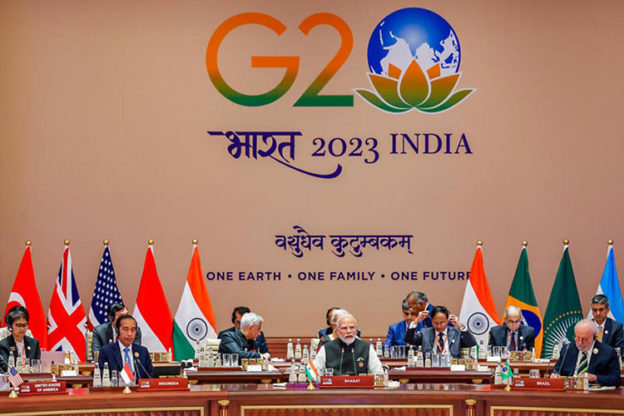The inclusion of the African Union into the G20 forum has significant implications for Indian businesses, top India Inc executives and experts say. India’s investments into Africa are around $74 billion, according to data from the ministry of external affairs, with investments driven by companies in sectors such as oil and gas, mining, telecom, pharma, textiles, automotive, fast moving consumer goods (FMCG) and agriculture.
A recent study by the Confederation of Indian Industry (CII) says that Indian investments into the African region can double to levels of about $150 billion by 2030 as Indian companies increasingly seek newer avenues of growth and look to optimise existing operations.
“Africa is poised to be a formidable driver of the global economy. Its recent inclusion in the G20 is not only timely but essential, paving the way for an environment conducive to innovation, prosperity and sustainability. With its rich mineral resources, and given JSW’s prominence in the metals and mineral industry, we are confident that this will open up new avenues for us,” Sajjan Jindal, chairman, JSW Group, told FE.
The JSW group has diverse businesses, including steel, energy, cement and paints, across India, the US, South America and Africa. In recent weeks, the group has been scouting for offshore coal mines in countries such as Australia, Canada and Africa for tie-ups to supply raw material to its growing operations, pointing to the relevance and importance of the continent both as a supplier and consumer market.
Reiterating the view, Sunil Mittal, founder & chairman, Bharti Enterprises, says the prospects of Africa for Indian businesses are significant despite geo-political challenges, currency and debt concerns of some countries. For instance, Nigeria’s recent demonetisation exercise has exacerbated inflation concerns in the country, which is a key market for many Indian businesses.
Yet Mittal remains bullish, having made a daring bet on the continent 13 years ago, when his company acquired Zain Telecom’s African operations in a $10.7-billion deal.
Speaking to FE, Mittal said that the group’s telecom arm, Airtel, will continue to invest further in Africa. “Our aim of providing last-mile connectivity, driving financial inclusion and empowering people digitally is having a significant and positive impact on sustainable growth in Africa,” said Mittal, who served as chair of B20 India Action Council on African Economic Integration.
“Africa being the last continent of hope will serve as the growth engine in the coming decades. The inclusion of the African Union as a permanent member of the G20 will encourage fresh investments and its integration in the global value chain, while offering huge business opportunities,” he said.
Mittal isn’t the only businessman to be bullish on Africa. Conglomerates such as the Tatas, the Godrej Group, Mahindra & Mahindra (M&M), Aditya Birla Group, Reliance Industries, Cipla, Wipro, Dabur, Marico and Emami have all made a beeline for Africa over 15 years ago, acquiring local businesses, setting up local manufacturing units and launching new products to tap into the growing aspirations of a consumers in that region.
In a media interaction on Monday, Anish Shah, M&M managing director and CEO, said that Africa was a key market for the conglomerate, where it has a large automotive operation. “Going ahead, we will look at investments in sectors like hospitality, trucks and real estate,” Shah said about the future prospects for the group in Africa.
Analysts tracking the FMCG sector say that consumer goods companies such as Marico, Dabur and Godrej Consumer derive about 25-30% of their international business revenue from the African continent, with the potential for further growth in the future.
Mohit Malhotra, chief executive officer, Dabur India, says that the move to include the African Union into G20 will help integrate the continent with the larger developed world.
“Africa is growing at a fast pace and so is India. At a broader level, the next phase of growth from a global perspective will come from regions such as Africa. So, it is a win-win for Indian businesses looking to expand their international operations. Of course, how bilateral treaties between India and Africa shape up will help define relations better,” Malhotra says.
Dabur, for instance, has pumped in close to `830-850 crore into its African operations, with over `580 crore going into capital expenditure and `250 crore into revenue expenditure.
The Tata group, on the other hand, is estimated to have made investments of over $1.7-2 billion (`13,000-16,000 crore) in Africa across businesses such as automobiles, steel, hospitality and information technology, according to experts. While companies such as RIL and ONGC, which have invested in the oil & gas sector in Africa, may increase their investments in the region.
https://www.financialexpress.com/business/industry-g20-inclusion-opens-up-a-continent-of-opportunities-3240600/





